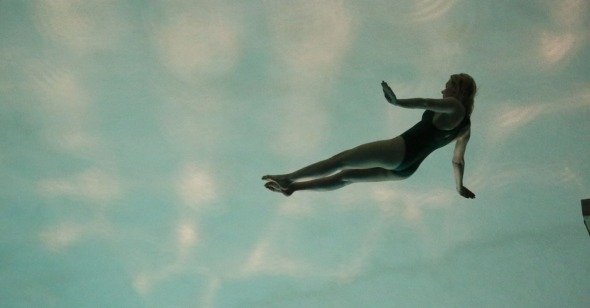Histoire(s) of the World, Part I
By Conor Williams
It’s Not Me
Dir. Leos Carax, France, Sideshow/Janus Films
A 40-minute follow-up to his 2021 Sparks musical Annette, It’s Not Me is Leos Carax’s tribute to Jean-Luc Godard, who died by medically assisted suicide in 2022. It’s Not Me is self-reflexive, political, and experimental, essentially Carax’s take on Godard’s Histoire(s) du cinéma (1988), in which the French New Wave pioneer stitched together clips from hundreds of films in order to create his own critique of the art form.
Carax faithfully mimics Godard’s style and structure with a raspy voiceover, colorful intertitles that split the work into chapters, and garish visual filters. As with Godard, some ideas and themes are decipherable, others less so. One is fatherhood: in home movie footage, his daughter asks him why he didn’t outrun a shark in her dream. “You direct your dreams, not me,” he tells her. A few moments later, Carax brings up the image of Roman Polanski, his childhood spent in a concentration camp, the brutal murder of his wife Sharon Tate, and the rape he committed not long after. “All of these men,” Carax says, meaning Polanski, “were born in the last century. Me too.” Exactly what he means with this aside is unclear. I read that last phrase as a nod to the “Me Too” movement that began in 2006 and skyrocketed in solidarity in 2017 with the downfall of Harvey Weinstein. France has had its own serious struggles with misogynist culture. Carax is either indicting or absolving himself of similar chauvinism.
Much of what Carax philosophizes about is clearly political. Some of it rings powerfully, some of it doesn’t. There are many references to Adolf Hitler. Carax shows a mother reading a bedtime story to her children about the “Final Solution.” There is a montage of faces of modern authoritarians: Putin, Netanyahu, and Trump, whose inclusion in this lineup for some reason made a woman in my press screening gasp. Carax also shows footage from an American Nazi rally that took place at Madison Square Garden in the 1930s. The filmmaker takes aim at Putin a few times, celebrating female protesters who bared their chests scrawled with rebellious messaging. The voice of the late Jonas Mekas intones about displaced persons over images of dead migrant children, the iconic and horrific image of three-year-old Alan Kurdi, whose body washed up on a beach in 2015. The image is still unbearable to look at today. (I thought of the children being murdered right now in Gaza and wondered why Carax does not mention Palestine. His inclusion of Netanyahu suggests disavowal of the Prime Minister’s actions, but he doesn’t address this directly in his text. Carax’s view of the crises affecting humanity seems largely Euro-centric.)
Putting aside questions of politics, It’s Not Me is clearly haunted by the ghost of Godard. Then again, all of cinema will be haunted for the rest of time by Godard’s suicide. It may well be that the art form is following him to the grave. The film is also haunted by the 2016 death of David Bowie, whose music was used in Carax’s 1984 debut feature Boy Meets Girl, as well as in his 1986 film Mauvais sang. Here, Carax swaps early Bowie tracks for the isolated vocals from the musician’s final single released during his lifetime, the morbidly direct “Lazarus.” “Look up here/I'm in heaven/I've got scars that can't be seen/I've got drama, can't be stolen/Everybody knows me now.”
While It’s Not Me is clearly modeled on Histoire(s) du cinéma, it’s not necessarily aiming to make the same sweeping claims about the history and future of cinema. It’s said that imitation is the sincerest form of flattery, and Carax has achieved something with more heft than just a rip-off or a pastiche of Godard’s work. It’s a playful film, and an earnestly thoughtful one at that. Carax does charge today’s cinema—or rather, the ever-moving, ever-growing, hyper-spectacle of our modern world of images—with the accusation that these images allow us no time to blink. They want us blind to the dangers of fascism and the evidence of lingering beauty in our daily lives.
It’s Not Me ends with a post-credits sequence starring Baby Annette, the titular wooden marionette of Carax’s 2021 film. With the help of her puppeteers, we see Annette run and dance to “Modern Love,” just as frequent Carax collaborator Denis Lavant did in Mauvais sang. She hurtles through the air, gently floats back to the ground, and turns to fix her gaze on the camera. While this coda doesn’t match the tone of the essay film before it, Carax ends on a crowd-pleasing note, welcoming Baby Annette into his company of collaborators, alongside Lavant and others. He is positioning his own work and characters within a personal artistic history and examining this filmography within the context of the greater questions of cinema—its purpose, its efficacy. He seems to ask, What have I made? What good will it do? That last question may only be answered with Carax’s next work. His vision reached new surrealist heights in Holy Motors (2012), and then he zig-zagged in 2021 with a musical melodrama. This new short is again quite different from what came before it. If there’s one thing to learn from It’s Not Me, it’s that Carax, like his cinematic idol before him, is far from finished exploring cinema’s possibilities.
